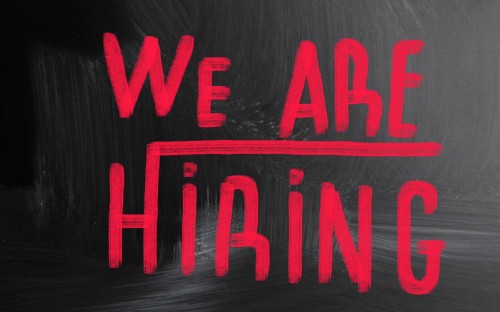The corporate recruiters and future chief executives crammed into the University of Westminster function hall to match CVs, swap business cards and flock their wares.
It was a great showcase for some of the biggest business school hirers such as Infosys, KPMG and Microsoft. Andrew Main Wilson, the Association of MBAs chief exec, enthused about the career prospects for today’s graduates.
“I am delighted that AMBA has been able to connect 400 high-calibre MBAs with 16 blue-chip global employers in just one afternoon in London,” he said.
“The quality and salary of job offers received on graduation are increasingly becoming key criteria in students' selection of business schools.”
Talent scouts regard the event as “critical” in the MBA recruiting calendar. Yet privately, business schools complained at a lack of options for some of its MBA students – internationals in particular.
The complaints were not entirely surprising. Campus recruiting had been cut back in both Europe and the United States. Big firms began scaling back their efforts and began working with only a small collective of reputable MBA providers.
Now a damning report has confirmed the huge gap between business schools and frontline managers. The campus cutbacks have paved the way for a revival of executive education.
Employers, spurning schools for recruitment, have instead been forking-out for their employees to attend expensive management education courses. It has been the biggest source of revenue for business schools.
In May, new rankings revealed an increasing appetite among companies. Ten schools increased their executive education revenues by more than 17% in 2013, on top of 13% increases in 2012. More than 40% of corporations are now considering increasing their spending on executive education over the next three years.
Marina Kundu, boss of executive education programs at HEC Paris, said: “Maintaining a leading position worldwide in the face of growing competition and an evolving landscape of executive education is an exciting challenge.”
But firms’ appetites for MBA graduates are more satiable. Today the Association of Business Schools, an independent MBA accreditor, has shaken up relations between companies and business schools.
ABS has revealed a starling disconnect between UK schools and businesses. Some employers have turned their virtual backs on business schools. More than 50% of employers surveyed in ABS’s report say they currently have difficultly hiring high-calibre managers – but only 17% of employers recruit directly from schools when looking for first-time managers.
Yet 45% of firms use business schools to train and develop staff focusing on executive education, rather than on recruitment.
There are wider concerns about the MBA jobs market, which many thought was in rude health. Only 22% of recruiters surveyed by ABS currently offer jobs or internships to business school graduates. Nearly 90% want to see more work experience imbedded in MBA programs. They argue it would make them more employable.
It is a problem that Lord Young of Graffham, the UK Prime Minister’s adviser on small business and enterprise, presented to the British Parliament last night.
Jane Harrington, vice chair of ABS, said: “This report underlines that the curricula must be robust and relevant, enabling students to embrace an innovative, ethical and entrepreneurial ethos and bring this into the workplace.”
The findings have highlighted a problem long associated with MBA programs: that they are too long on theory and too short on practical experience.
But business schools, which have still posted impressive employment statistics, are of a mind to ramp-up their relations with employers.
Three years ago, a young Russian insurance banker was busy trying to mint his first fortune in Britain.
Born and raised in Moscow and entering the peak of his career during the financial crisis, Vladimir Brenner was the brains behind a bevy of top insurance firms. The global economy was on the mend and he was in business development, but that wasn’t ambitious enough for the young Russian.
“I needed to be in a multi-national environment with a business school that holds a world-renowned reputation,” said Vladimir.
After making a “split-second” decision to enrol at Bath University School of Management, Vladimir was soon hitting the big-time in the insurance market.
After starting Bath’s full-time MBA program, he landed a summer internship at Intel Corporation. He has been an employee at the firm's Swindon base ever since.
“I’m absolutely certain an MBA was essential in me getting this job. It would have been much more difficult without getting that three-month placement,” said Vladimir.
“It was critical to land this job and I don’t think I’d get it without this placement – and without Bath – in the first place.”
However, the lack of placement opportunity has become a lightning rod for criticism. In its report, ASB made plain that internships – the traditional route into post-MBA careers – were becoming few and far between.
Petra Wilson, director of strategy and external affairs at the Chartered Management Institute, said: “It increases students’ employability… there is a missed opportunity there.”
Even though business schools land internships for the majority of their students, there are concerns that they are not first-choice. Calls for closer ties between businesses and business schools have never been louder.
The report, compiled by the CME, the Quality Assurance Agency and ABS, saw that meaningful work experience would develop MBA’s skills through learning by doing.
Ann Francke, chief executive of the CMI, said that stronger collaboration between business schools, employers and professional bodies will result in a better generation of leaders.
She added: “It’s a win-win situation because employers get professionally trained, practically-skilled managers who can deliver results from day one – while graduates boost their career and progression prospects.”
Lu Han, a full-time MBA student at London’s Cass Business School, is the type of graduate who will give business schools food for thought.
She is not content to trudge through static business cases. Teaching theory alone is never enough, Lu argued – “you can't learn to cycle with the manual". She added: “You need to get out there, fall a few times and reflect on what works. Theory might help you understand the bike, but it will not help you ride it.”
On the course as Cass, students can hear London’s calling. A bevy of executives gathered in the east end of the city for the business school’s first MBA London Symposium last month.
Sir Richard Broadbent, chairman of the FTSE 100 supermarket chain Tesco, and Sir William Sargent, CEO of the Oscar-winning visual effects firm Framestore, were among the distinguished guests who networked with MBA students.
Senior execs from BlackRock, HSBC and the Bank of England also graced the school’s grounds.
Cass is one of a legion of business schools that are trying to broker better links to businesses. Putting business theory into practice has become paramount.
“The application of classroom knowledge in group assignments and projects for companies helps embed learning in skills and capabilities,” said Dr Sionade Robinson, associate dean of MBA programs at Cass.
At Imperial College Business School, for example, MBA students take part in the Imperial Innovation Challenge, an intensive week that brings together theory and practice.
Mark Davies, Imperial’s employer relations manager, said: “Businesses have been less willing to take a chance on MBA recruits with potential, looking instead for those who have the practical skills and experience they are sure can deliver value from day one.”
Yet businesses are still in the dark when it comes to business school relations. Some 40% of employers surveyed by ABS could not say if business schools did or did not understand the needs of organisations like theirs, while 47% could not say whether or not schools are well-connected with the local business community.
These perceptions mean that 31% of employers do not think there is a business case for working with b-schools. This is despite evidence that business and management education provides £3.25 billion of revenue to the UK.
The ultimate fear is that employers continue to stray from campus and do not engage with careers departments.
“It is attitudes that they haven’t done it before and don’t know the art of the possible,” said Petra from the CMI. “They’re used to using recruitment agencies. They’re not even aware of the opportunities that business schools offer.”
Student Reviews
University of Bath School of Management (MBA)
RECAPTHA :
fc
4c
af
13








